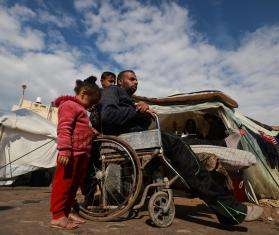Brussels/New York, February 26, 2020–Yesterday, February 25, the Syrian government and its allies reportedly launched indiscriminate attacks on civilian areas in Idlib governorate, northwestern Syria, including schools where displaced people had sought refuge, said the international humanitarian organization Doctors Without Borders/Médecins Sans Frontières (MSF). Three hospitals near the frontlines supported by MSF received 185 wounded patients, including children, and 18 people who were dead on arrival.
MSF General Director, Meinie Nicolai, gave the following statement:
“The horrific indiscriminate campaign of bombing and shelling yesterday can only conceivably have been conducted by the Government of Syria and its allies. We do not know how to make them stop indiscriminate attacks, and we do not know how to make them abide by International Humanitarian Law—the rules of war. We have called many times on the parties to the Syrian war, their allies, and the UN Security Council to do everything possible to bring an end to these violations. We make that call again, with the highest degree of urgency. Civilians and civilian infrastructure must be protected, and our call to respect the rules of war applies as much to opposition groups and the Turkish forces as to the Syrian government and its allies, including Russia, the main military ally of the Syrian government.”
Throughout the afternoon and evening of February 25, bombs and shells struck areas in and around Idlib city and Mareet Misirin town, where hundreds of thousands of people had fled from previous attacks on nearby areas. At least two schools and two kindergartens hosting displaced families were hit.
Three MSF-supported hospitals in the area received influxes of patients in critical condition. One of the surgeons in Idlib surgical hospital told MSF’s support team: “Some of the injuries were amputations, neurological injuries, and many other injuries. It was a hysterical situation in the city. Along with the sound of bombings and the sound of sirens, people had panic attacks. It was a difficult, bloody day.”
Initial patient registers from two of the hospitals MSF supports—Idlib Central and Mareet Misirin—show 66 patients had severe or critical wounds requiring major surgical operations, and at least 14 of the severely wounded patients were children.
Both hospitals were almost hit by bombing or shelling, with projectiles landing less than 330 feet away. Four medics working for Idlib Central hospital sustained minor blast wounds.
Indiscriminate and targeted bombing and shelling on civilian areas has become the terrible norm during the Syrian war. The Syrian government must stop attacks on civilians and abide by International Humanitarian Law and respect the rules of war.
“How many mothers need to hold their baby in their arms while bombs are falling everywhere?” said Cristian Reynders, MSF project coordinator for northwestern Syria. “How many fathers need to reassure their children and make them laugh, while fire breaks out all around? There is one thing people in Idlib keep hoping for—to preserve human life. And their hopes are lowering by the minute, by the day.”
MSF has provided donations of emergency medical supplies to Idlib Central hospital, Mareet Misirin hospital, and Idlib surgical hospital over recent weeks, as the frontlines have advanced towards Idlib city. MSF has supported one of these facilities for almost one year. MSF provides remote support only; we have no staff members present in these three hospitals.
Across northwestern Syria, MSF teams provide maternal health care, general health care, and treatment for non-communicable diseases (NCDs) through mobile clinics. Our teams distribute relief items and improve water and sanitation systems. They also support regular vaccination activities in two vaccination centers, one hospital, and through mobile clinics.
MSF also runs a specialized burn unit that provides surgery, skin grafts, dressings, physiotherapy, and psychological support. MSF provides remote support to primary and secondary health care to several hospitals and clinics around Idlib and Aleppo,and has co-management partnerships with three hospitals.
MSF’s medical programs across Raqqa and Al Hasakeh and Aleppo governorates in northeastern Syria continue despite having been temporarily reduced or suspended in October 2019. MSF has progressively resumed some activities in Al Raqqa, Al Hol, Al Roj and Newroz camps, Kobane/Ain Al Arab, and Tal Kochar/Yaroubiyah. We have not yet been able to return to supporting the Tal Abyad hospital in northeastern Syria nor return to the surrounding area from which the majority of the population, including medical staff, fled in October.
To ensure independence from political pressures, MSF receives no government funding for its work in Syria.




